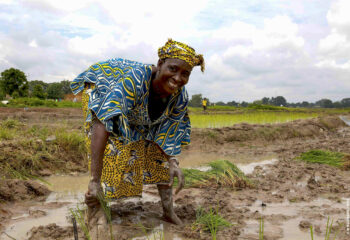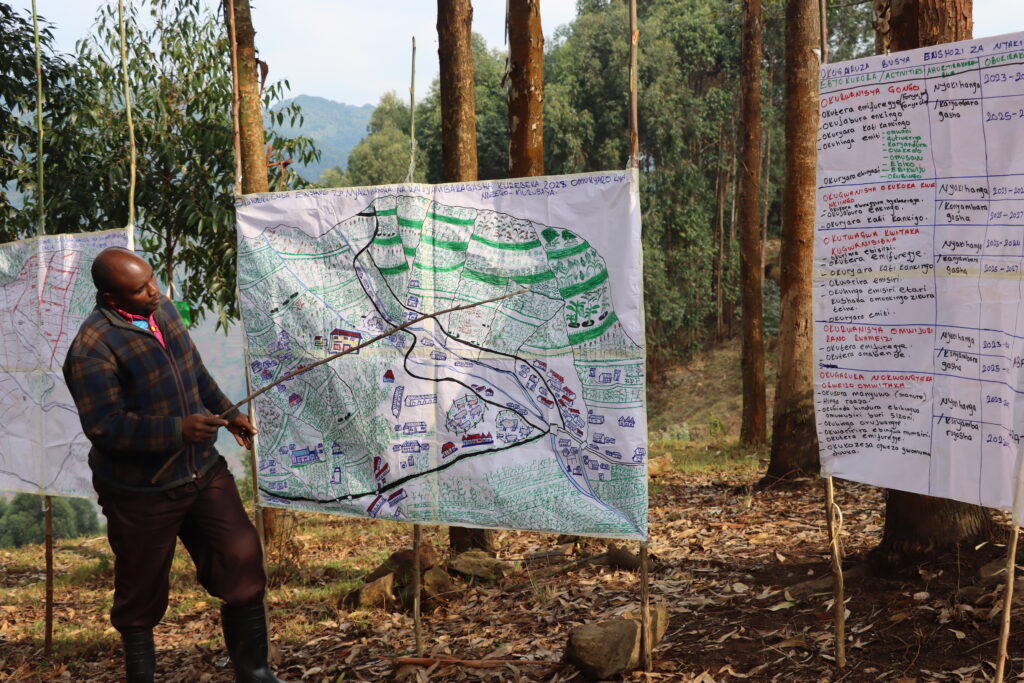
Every Thursday, residents living near the Nyakihanga-Kanyambaragasha watershed in western Uganda pause their daily routines to focus on a shared goal: restoring their degraded landscape. Armed with tools such as pickaxes and hoes, they work together to rehabilitate this critical watershed, which has suffered from severe erosion, leading to crop loss and damage to homes during the rainy season.
The watershed’s degradation has led to a host of additional challenges for the community, including gully formation, mudslides, waterlogging, and declining soil fertility.
“Our vision is to make this landscape livable again, and we plan to plant coffee trees to enhance our income and help slow down the flow of rainwater. The community is fully committed to restoring this landscape with guidance from the BRIGHT project.”
Byamukama Simeo, landscape engineer
These issues were identified during community-wide Integrated Farm Planning (PIP) meetings. In response, the community, with support from the Building Resilience and Inclusive Growth of Highland farming systems for rural Transformation (BRIGHT) project, developed a plan to restore the watershed. This plan includes constructing soil and water conservation structures, such as trenches, to prevent further erosion.
More than 1,700 family households that grow crops such as beans, sorghum, potato, vegetables, and eucalyptus on small plots of land between 0.1 and 1 acre each are now actively participating in the restoration efforts.
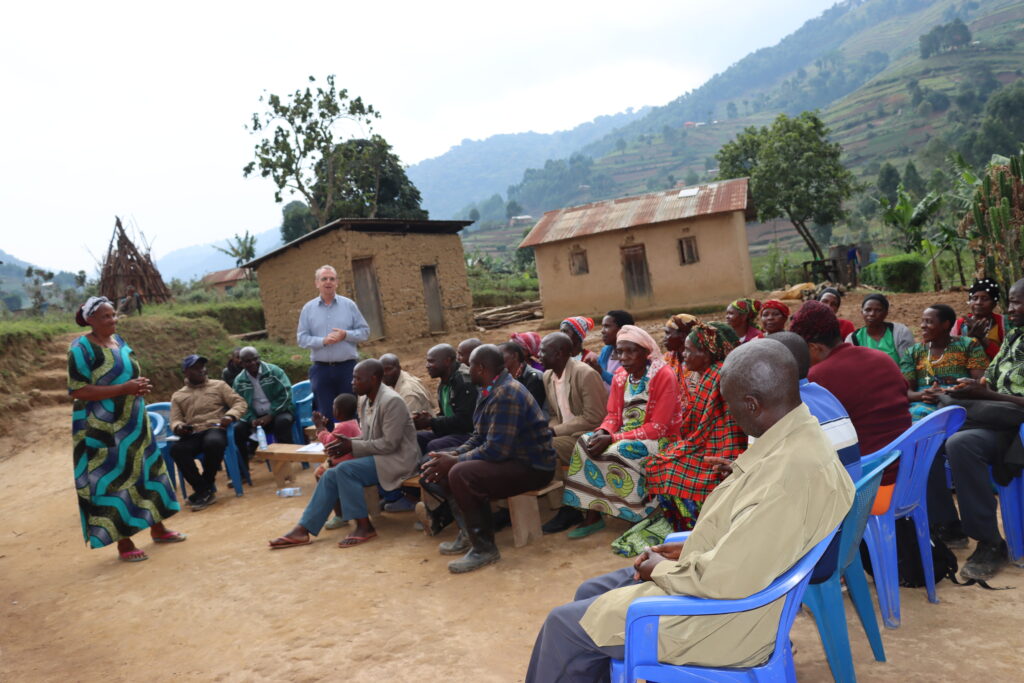
Organized by the Village Vision Committee and working in social groups called Ngozi, the community has made significant progress. Their efforts have reduced surface runoff and allowed farmers to resume cultivation on downslope plots, where flash floods had previously made farming impossible.
Ngozi groups are community-based organizations focused on improving livelihoods, social welfare, health, and environmental conservation. They are composed of between 30 and 200 local community members and among them, they elect leaders, including Chairperson, Secretary, and Treasurer.
They create partnerships with the government, NGOs, and the private sector to improve household incomes through sustainable agriculture, livestock, and entrepreneurship, enhancing financial inclusion through savings and credit schemes, promoting market access for local products, protecting and restoring natural resources (forests, water sources), and promoting climate-resilient agriculture practices.
Ngozi groups play a vital role in addressing local development challenges. By supporting community-led initiatives, these groups promote sustainable development, social cohesion in households, environmental conservation, and agriculture production. All this is done through communal work with strict adherence to rules and regulations.
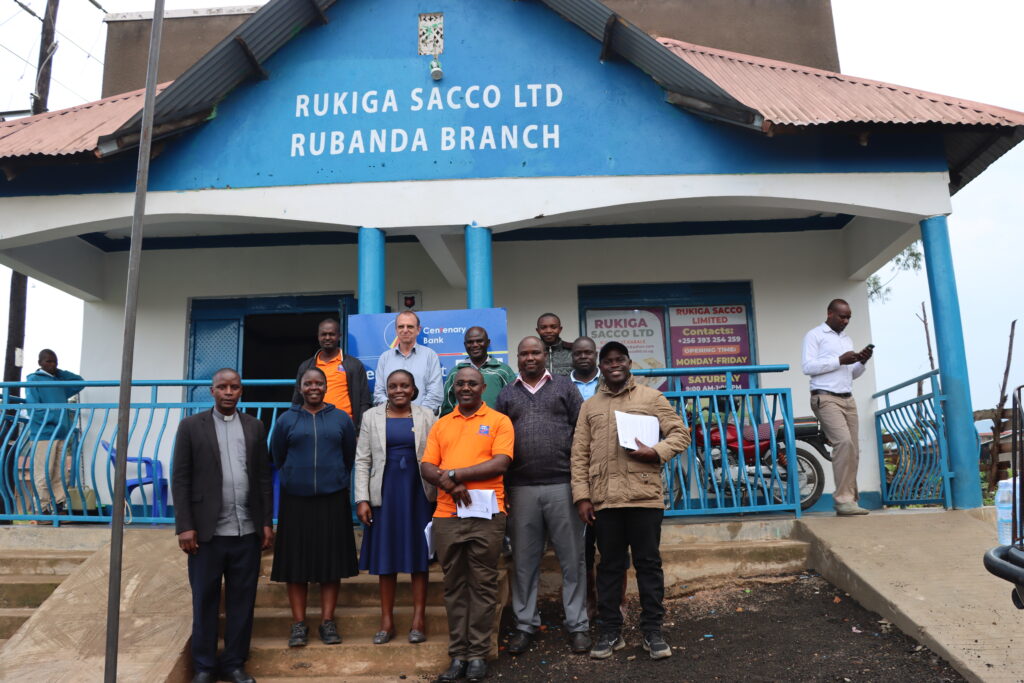
“Our vision is to make this landscape livable again, and we plan to plant coffee trees to enhance our income and help slow down the flow of rainwater. The community is fully committed to restoring this landscape with guidance from the BRIGHT project,” remarked landscape engineer Byamukama Simeo.
One committed member of this restoration effort is Scola Arinaitwe, a first-generation farmer from the village of Ndego. Her household, like many others within the landscape, is deeply invested in the restoration process because they are directly affected by the degraded environment. “We were trained as a community by the Ngozi group about the impact of the degraded landscape and how it affects us all,” said Scola.
“My family joined the restoration effort after receiving training on the PIP approach and sustainable land management practices. We developed a vision and action plan, which we are now implementing.”
Scola arinaitwe, Farmer from the village of ndego
The BRIGHT project is also addressing economic challenges the community faces. The Kamuko Youth Group, a local farmers’ group, has encountered several market issues, including low yields, fluctuating prices, and a lack of collective storage facilities. Additionally, a high interest rate of 10% on loans from village savings and loan associations (VSLAs) and limited access to quality seeds have hindered their agricultural activities.
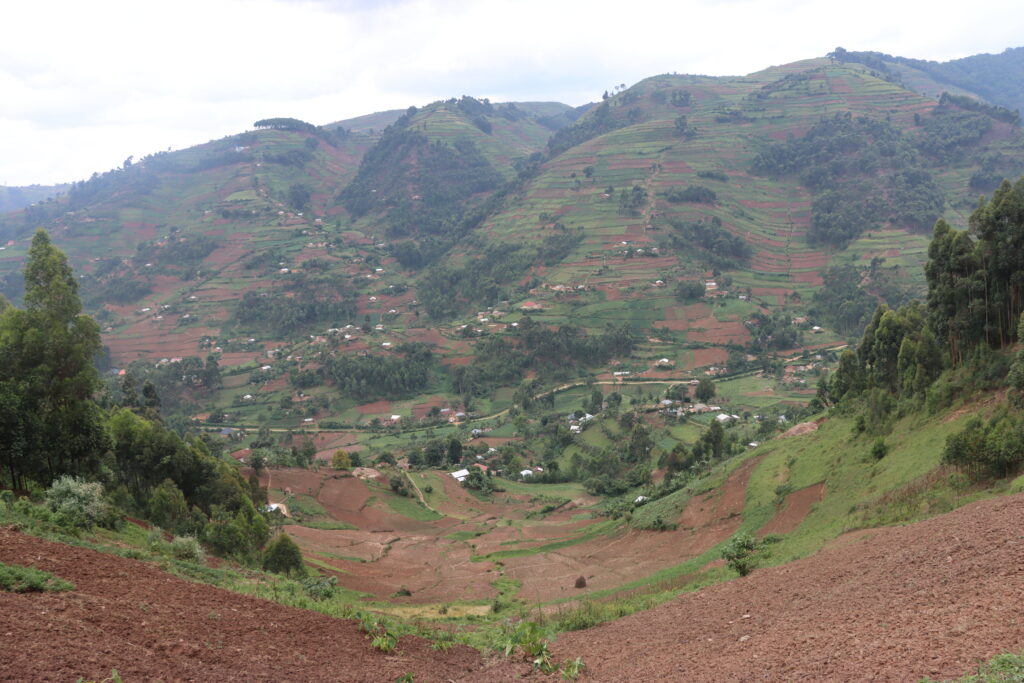
In response to these challenges, the group members proposed several solutions, which include:
- improving access to quality seeds
- collectively procuring agro-inputs
- bulking and marketing
- improving record-keeping
- opening a group bank account with a nearby savings and credit cooperative (SACCO)
- reducing the interest rate on VSLA loans from 10% to 3%
- saving for school fees
- and training on good agronomic practices and land management.
These initiatives were integrated into a group vision that addresses market issues and links the group to the Muko Cooperative for better access to seeds, output markets, and extension services.
The farmer-owned Muko Cooperative was established to enhance production and marketing. However, the cooperative initially faced management issues, low membership, poor market connections, and limited access to inputs. With BRIGHT’s support, the Muko Cooperative has been linked to the Rukiga SACCO, securing 50 million UGX (approximately U.S. $13,536) in working capital, which has improved their operations.
BRIGHT continues to strengthen connections of SACCOs, cooperatives, and VSLAs with financial institutions, providing community groups with access to affordable loans. This support enables farmers to invest in their agricultural ventures, helping them build resilience and secure their futures. These connections, along with BRIGHT’s support for community-wide restoration projects such as the Nyakihanga-Kanyambaragasha watershed, improve yields, livelihoods, market conditions, and more.
With funding from the Ministry of Foreign Affairs of the Netherlands, the BRIGHT project is enhancing the resilience of 100,000 highland farm households in Uganda against economic and climate-related shocks, supporting households through inclusive farm planning and decision-making, introducing climate-smart agriculture techniques and technologies, strengthening local farming systems, conserving natural resources, and developing strategic value chains. BRIGHT is implemented in cooperation with Agriterra, the Uganda Ministry of Agriculture, Animal Industry and Fisheries (MAAIF), the National Agricultural Research Organization (NARO), district local governments, and private sector partners.



